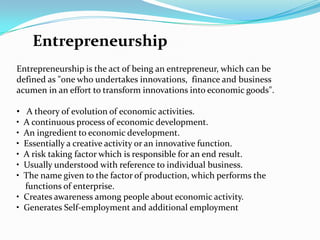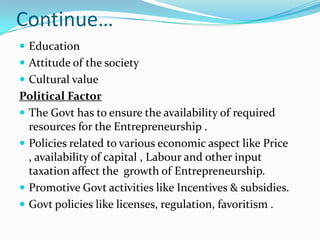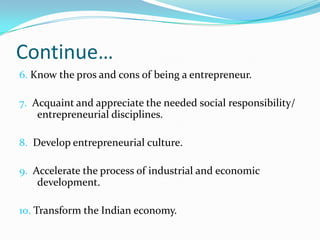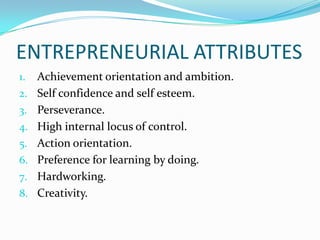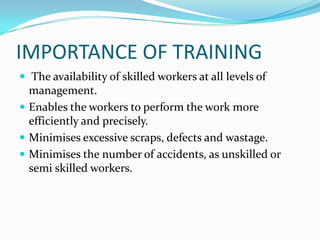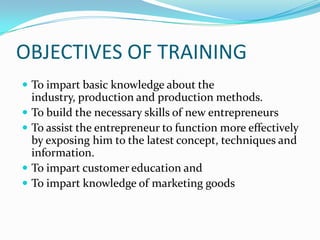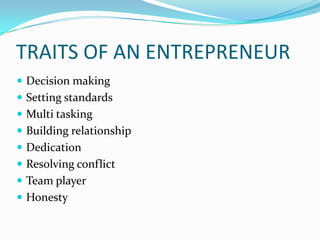Enterpreneurship. 01
- 1. ENTREPRENEURSHIPCHAPTER NO- 01.Presented by:-Vikash kumarAbhishek NiranjanSwapnil KumariSonaliJitendra GuptaSarita TripathiPankaj Kumar VermaAbhishek Pratap SinghPooja GuptaKrishan Kumar
- 2. CONCEPTS AND DEFINATIONS OF ENTREPRENEURSHIP
- 3. Entrepreneur An entrepreneur is a person who has possession of a new enterprise, venture or idea and is accountable for the inherent risks and the outcome.According to:Peter drucker : “Entrepreneur is one who always searches for change, response to it and exploit it as an opportunity”.Richard Schumpeter : Entrepreneur is one who innovator, raise money, collects inputs,Organises talent, provided leadership and set the organisation in proper order.International Labour Organisation, I. L.O(1982) : “ Entrepreneur are people who the ability to see and evaluate business opportunity; to gather necessary resources, to take advantage of them and to initiate appropriate action to ensure success”.
- 4. Various views of the term “Entrepreneur”1. Entrepreneur as a Innovator : The introduction of a new product in to the market.
- 5. The discovery of a new source of supply of a raw material.
- 6. The opening of a new market into which the specific product has not previously entered.2. Entrepreneur as an organiser :Uncertainty of profits.
- 7. Command over sufficient capital and
- 8. Moral qualities for work judgement , perseverance and a knowledge about the business world.Entrepreneur as a Risk taker : Entrepreneur as an agent who buys factors of production at a certain prices in order to combine them into a product with a view to selling it at uncertain prices in future.
- 9. Who is an Entreprenuer• He is a person who develops and owns his own enterprise • He is a moderate risk taker and works under uncertainty for achieving the goal. • He is innovative • He peruses the deviant pursuits • Reflects strong urge to be independent. • Persistently tries to do something better. • Dissatisfied with routine activities. • Prepared to withstand the hard life. • Determined but patient • Exhibits sense of leadership • Also exhibits sense of competitiveness • Takes personals responsibility • Oriented towards the future. • Tends to persist in the face to adversity • Convert a situation into opportunity.
- 10. The characteristics of an unique entrepreneur are : - Need for achievement
- 11. - High need for power
- 12. - Independence
- 13. - Propensity to take risk
- 14. - Personal modernity
- 15. - Support
- 16. - Business enterprise
- 17. - Leadership EntrepreneurshipEntrepreneurship is the act of being an entrepreneur, which can be defined as "one who undertakes innovations, finance and business acumen in an effort to transform innovations into economic goods". A theory of evolution of economic activities. • A continuous process of economic development. • An ingredient to economic development. • Essentially a creative activity or an innovative function. • A risk taking factor which is responsible for an end result. • Usually understood with reference to individual business. • The name given to the factor of production, which performs the functions of enterprise. • Creates awareness among people about economic activity. • Generates Self-employment and additional employment
- 18. Why Entrepreneurship• To improve backwardness of the people. • Economic development of the region. • To analyze resource utilization. • Proper utilization of human potentiality. • Special attention to take up new activities. • To create self-employment and generation of employment opportunity. • Eradication of regional imbalances. • Better economic gain.
- 19. Create new jobs.Productivity through new technologyOpportunity for positive and significant effect.Self employmentGDP growthGlobalization Sustain economic growth ECONOMIC DEVELOPMENT
- 20. CLASSIFICATION OF ENTREPRENEURSAccording to the types of business.According to the use of technology.According to the motivation.According to the growth.According to stage of development.
- 21. A. According to the types of businessAgriculture entrepreneur a. Horticulture b. Dairy c. Forestry 2. Corporate entrepreneur3. Industrial entrepreneur a. Large b. Medium c. Small
- 22. Contd.4. Trading entrepreneur 5. Business entrepreneur
- 23. B. According to the use of technologyProfessional entrepreneur.2. Non-technical entrepreneur3. Technical entrepreneur
- 24. C. According to the motivation1. Spontaneous Entrepreneur2. Motivated Entrepreneur3. Induced Entrepreneur4. Pure Entrepreneur
- 25. D. According to growth1. Growth Entrepreneur2. Super growth Entrepreneur
- 26. E. According to the stage of development1. First generation Entrepreneur2. Modern Entrepreneur3. Classical Entrepreneur
- 27. Personal Entrepreneurial CompetenciesThese competencies can be grouped into 3 main clusters and the EMPRETEC model has merged some of these competencies to derive 10 PECs. Achievement ClusterOpportunity Seeking and Initiative Risk Taking Demand for Efficiency and Quality Persistence Commitment to the Work Contract
- 28. Planning ClusterInformation Seeking Goal setting Systematic Planning and MonitoringPower ClusterPersuasion and Networking Independence and self-confidence
- 29. FACTOR THAT AFFECT ENTERPRENEURSHIP GROWTHEconomic Factor CapitalLabour Raw materialMarketInfrastructure Social FactorCaste favourFamily background
- 30. Continue…EducationAttitude of the societyCultural value Political FactorThe Govt has to ensure the availability of required resources for the Entrepreneurship .Policies related to various economic aspect like Price , availability of capital , Labour and other input taxation affect the growth of Entrepreneurship.Promotive Govt activities like Incentives & subsidies.Govt policies like licenses, regulation, favoritism .
- 31. ENTREPRENEURSHIP DEVELOPMENT PROGRAMMESEDP means programmes designed to help a person in strengthening his entrepreneurial motive and in acquiring skills and capabilities necessary for playing his entrepreneurial role effectively.A programme not touching entrepreneurial motivation and behaviour cannot be called as an EDP.
- 32. Continue…..EDP primarily focuses on developing those first-generation entrepreneurs who on their own cannot become successful entrepreneur.
- 33. NEED OF AN EDPHigher rate of economic growth.Development of backward and tribal areas.Creation of employment opportunities.Improvement in the standard of living.Promoting small-scale industries.To promote women entrepreneurship.
- 34. NEED (Continue..)It covers three major variables:- LocationTarget group andEnterprise Any of these can become the starting point for initiating and implementing an EDP.
- 35. OBJECTIVES OF EDPEDP helps entrepreneur to:-Develop and strengthen entrepreneurial quality and motivation.Analyze small industry and small business environment.Select project/product.Formulate projects.Understand the process and procedure of setting up of small enterprise.Acquire the basic management skills.
- 36. Continue…6. Know the pros and cons of being a entrepreneur.7. Acquaint and appreciate the needed social responsibility/ entrepreneurial disciplines.8. Develop entrepreneurial culture.9. Accelerate the process of industrial and economic development.10. Transform the Indian economy.
- 37. ENTREPRENEURIAL BEHAVIOURSGrasping opportunities.Taking initiative.Solving problems creatively.Managing autonomously.Taking responsibility for, and ownership of things.Seeing things through.Networking effectively to manage interdependence.Using judgment to take calculated risk.
- 38. ENTREPRENEURIAL ATTRIBUTESAchievement orientation and ambition.Self confidence and self esteem.Perseverance.High internal locus of control.Action orientation.Preference for learning by doing.Hardworking.Creativity.
- 39. ENTREPRENEURIAL SKILLSCreative problem solving.Persuading.Negotiating.Selling.Proposing.Managing business/projects/situations.Strategic thinking.Intuitive decision making under uncertainty.
- 40. TYPES OF EDP IN INDIAIndustrial Motivating Programme.Entrepreneurship Development Programme.Skill Development Programme.Management Development Programme.Entrepreneurship Awareness Training Programme.Product-oriented Entrepreneurship Development Training Programme.Target group-oriented Entrepreneurship Development Training Programme.
- 41. STRUCTURING EDPIdentification and careful selection of entrepreneurs.Developing and motivating entrepreneurial capabilities of the trainee.Equipping the trainee to identify viable industrial project/prepare project profiles or brief project reports.Equipping the trainees with basic enterprise-building skills.Imparting basic managerial skills.Helping the trainees to secure the necessary financial, infrastructural and related business assistance during the implementation of the project.
- 42. THE OPERATIONAL PROBLEMS OF EDPNo proper strategy.No local support.Non-availability of inputs.No adequate research facilities.Inconsistent programme design.No clear-cut objective.Lack of clarity in approach andLack of creativity and commitment.
- 43. ENTREPRENEURIAL TRAININGTraining is the systematic instruction of staff at all levels in new attitudes or new skills.
- 44. IMPORTANCE OF TRAININGThe availability of skilled workers at all levels of management.Enables the workers to perform the work more efficiently and precisely.Minimises excessive scraps, defects and wastage.Minimises the number of accidents, as unskilled or semi skilled workers.
- 45. IMPORTANCE OF TRAINING(cont…)Training reduces fatigue.Training enables the worker to work speedily.Training improves the good relation between employees and management.New techniques can be easily adopted by through trained employees.Standardization can be adopted.
- 46. IMPORTANCE OF TRAINING(cont…)Training enable employees to occupy higher position of authority.The supervision cost can be minimised.
- 47. OBJECTIVES OF TRAININGTo impart basic knowledge about the industry, production and production methods.To build the necessary skills of new entrepreneursTo assist the entrepreneur to function more effectively by exposing him to the latest concept, techniques and information.To impart customer education andTo impart knowledge of marketing goods
- 48. METHODS OF TRAININGIndividual instructionGroup instructionLecture methodDemonstration methodWritten instructional methodConferenceMeeting
- 49. DESIGNING AN ENTREPRENEURIAL TRAINING PROGRAMMESetting training objectivesTraining objectivesDeveloping course contentChoosing appropriate training methods
- 50. MODULES OF TRAINING PROGRAMMEIntroduction of entrepreneurshipMotivation trainingEssentials of management - general management - marketing management - production management - financial management
- 51. MODULES OF TRAINING PROGRAMME(cont.)Fundamentals of feasibility studyOrganizing the businessPlant visit
- 52. QUALITIES OF AN ENTREPRENEURMotivation towards achievementCreativityClarityInnovativeRisk-takingFlexibilityAdaptability
- 53. QUALITIES OF AN ENTREPRENEUR(cont..)DeterminationWill powerTactfulnessSelf-confidenceIntelligentinstinct
- 54. TRAITS OF AN ENTREPRENEURDecision makingSetting standardsMulti taskingBuilding relationshipDedicationResolving conflictTeam playerHonesty
- 55. TRAITS OF AN ENTREPRENEUR(cont…)ApproachableAppreciating skillsIntegrityTrustPassion Patience CapabilityInvolvement
- 56. ENTREPRENEUR vs PROFESSIONAL MANAGERFeatures of a professional managerSpecialistSkilled, knowledgeableStrategic planningFormal communicationOrganizingControllingMotivating.
- 57. DISTINGUISHING FEATURES OF A MANAGER AND AN ENTREPRENEURMANAGERPrimary motive-want promotion, reward& power.Managers are employees(specific role)Limited scope of innovation and creativityManagerial jobs are transferableManager do not bear riskManagers need team building and leadership role.Manager need knowledge and expertise.
- 58. ENTREPRENEURPrimary motives-want freedom, goal oriented & self motivated Entrepreneurial function is organsing production.Decision making and calculated risk bearing.Has all round responsibility.Public relation and team building.High level of achievement and motivation.Innovative, imaginative soul.
Editor's Notes
- Perseverence-Determination,persistence,endurance,commitment,patience
- Intuitive-A natural and spontaneous tendency which appears true without having some reasoning








